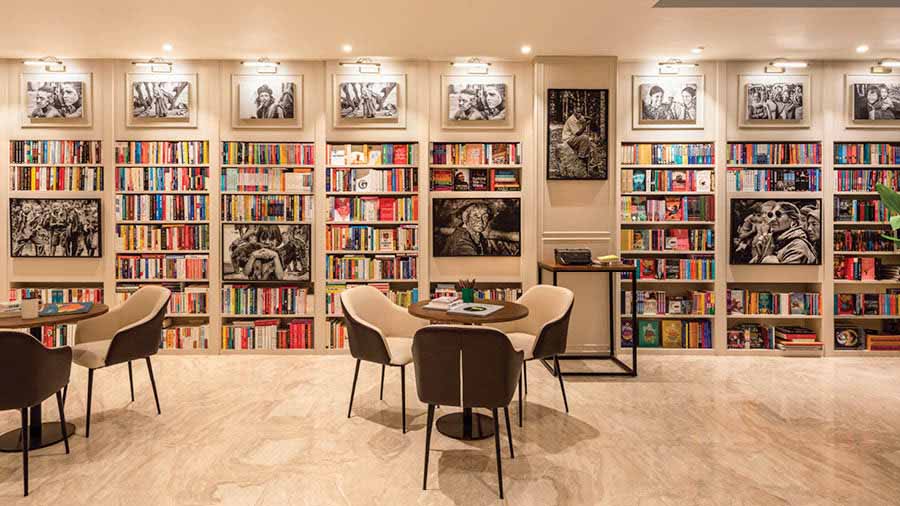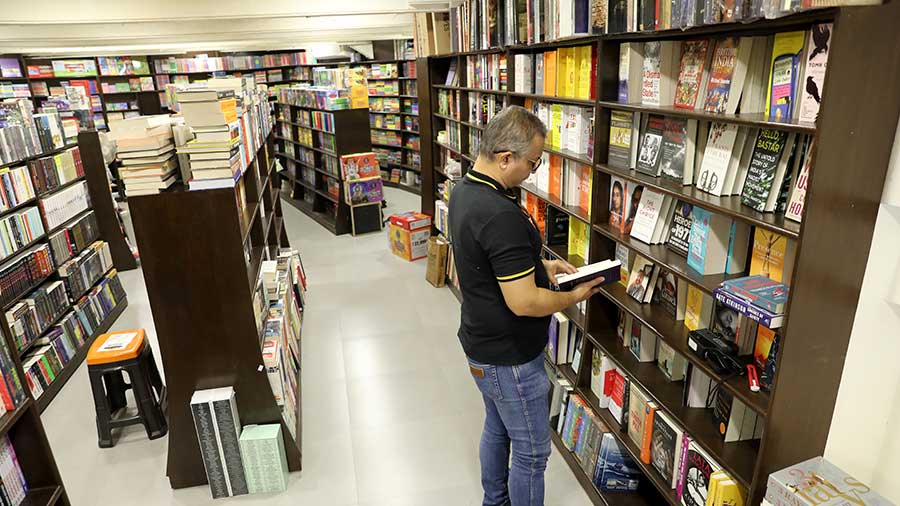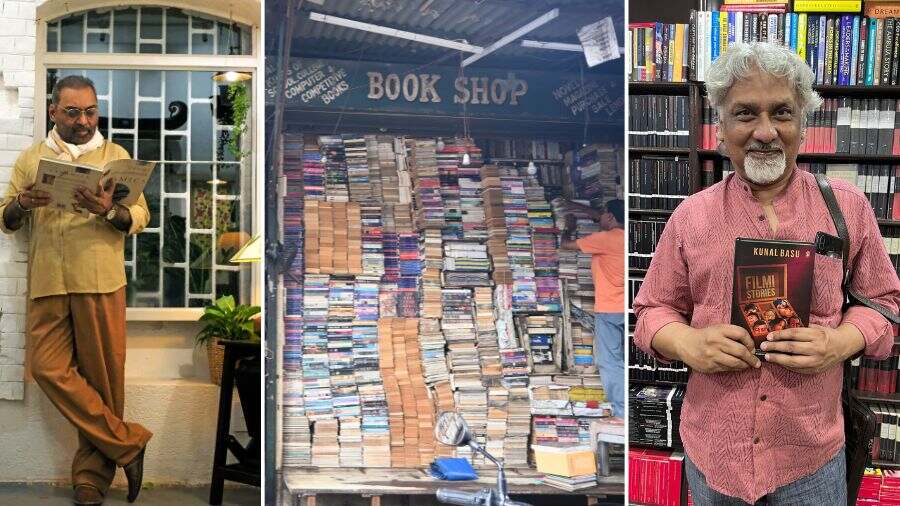It is a bookstore unlike any I have been to, and that’s saying a lot. I enter it and am transported to a booklover’s paradise. Kunzum at M Block Market, Greater Kailash 2, New Delhi, has grown to four floors spread over 10,000 sq ft. The first floor is the regular bookstore, the second the Penguin bookstore. The third the ‘Theatre Kunzum’ – a 125-seater events hall – and the fourth an 80-seater theatre that also hosts a cafe. There are other Kunzum bookstores that are 2500 sq ft each. The original Kunzum Travel Café is approximately 500 sq ft.
My Kolkata caught up with the store’s proprietor Ajay Jain and brilliant curator Subir Dey. What makes it stand out is that Ajay can visualise a store chain like this in this day and age where we hear a constant refrain of brick-and-mortar stores closing down. Of how difficult it is to sustain one in the age of Amazon. As Jain says: “I was very clear from day one. We will not sell teddy bears, stationery, croissants (chuckles). It might be a slightly steeper learning curve, but we want to learn how to sell more books. If I’m not selling enough books, why am I in this business? For me, it’s a social mission to push more people to read. When we read books, we also challenge consumerism — we are taking the money away from buying other stuff to buy books.”
A gateway drug into reading
Dey is the backroom star of the show. Given the extraordinary range of books, including rare and collectors’ editions — I picked myself a mind-blowing one on iconic book covers, The Look of the Book, by Peter Mendelsund and David Alworth.
A quiet, self-effacing booklover, Dey says: “I have been doing this for myself, at home, before Ajay started the bookshops. One day, I just picked up the phone and asked him, how can I help? Then, there is the community angle. I talk to fellow bibliophiles both online and offline who point out all the amazing editions of great books. The curation team at Kunzum is indispensable. Everyone has their favourite genre and we all diligently keep track. The classics and graphic novels are an easy target because of their popularity. Then there are collected works and commemorative editions that we try to keep track of. Publishers help us with that too. For example, the Dune series picked up when the new movie came out. There are so many beautiful editions of the book that it is hard to choose.
“We have seen an uptick in the interest among buyers who are looking for a specific edition of their favourite books and our team is happy to track them down. Books are the best gift you can give to people. We tell our customers to bring a book to a party full of people who are bringing bottles of wine. We used to give and receive books as gifts, growing up. Those books shaped our worldview. There are graphic adaptations of long-form novels like 1984, Animal Farm and The Kite Runner that we tracked down and have in stock. These are great books for someone who is intimidated by the traditional long-form novel format. This could be their gateway drug into reading and Kunzum would love to get them addicted.”
The beginnings
Jain had a background in engineering and management before he dropped everything and moved to the UK to study journalism a decade ago. He hit the road as a travel writer and found himself in Spiti, a high-altitude region in Himachal Pradesh. He drove for hours in a desert area with no road signs or mobile signals, following the track marks of other cars. And then he realised he was lost.
“I just kept driving. Imagine not seeing another human being for hours in a country like India. Suddenly I came upon a plateau, upon a sign that said ‘Kaza’, which was where I was headed!” says Ajay. “That spot — Kunzum-La — was the most astounding place. As I looked around, the only thing I saw were snow peaks and Buddhist flags. There was breathtaking silence. I thought to myself, if this is what the planet is, if this is what India is, I want to be a travel writer. In that moment, not only did I find my direction to Kaza, I found my direction in life as well. After I returned, I called my blog kunzum.com.”
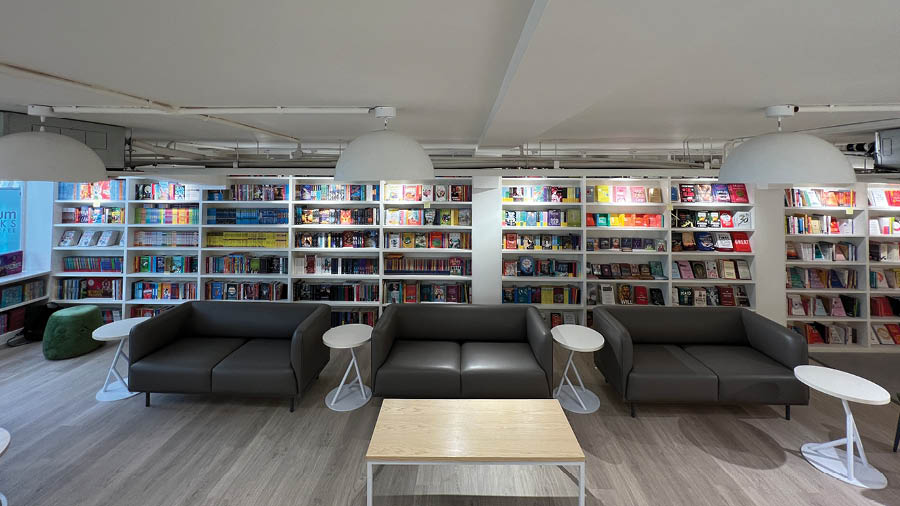
The Greater Kailash location of Kunzum
Photo gallery to travel cafe to bookstore chain
Jain had opened a gallery in Hauz Khas Village in 2009, for his photographs, of which he sold one print that year. To draw people in, he opened a small library for people to borrow books, and decided to serve tea, coffee and cookies. “After we rebranded to make it Kunzum Travel Café, the place took on a life of its own. A few days after we opened, someone came in asking if we could do a poetry reading. Before we knew it, we had over 200 events happening in the cafe every year. There were all sorts of events — book launches, film screenings, poetry events, talks, etc. My main motivation was still to get people in to see the photographs and books,” says Jain.
After Jain wrote his first novel, he started to set up a national book club when it occurred to him that he could turn Kunzum Travel Café into a chain of reading rooms. Since that was not a sustainable business model, he decided to open a chain of bookstores. “I did a bit of reading, given that stores were closing all over the world and the rise of Amazon. If Amazon did not offer such discounts, many more bookshops would be open today. I blame publishers squarely for this, not Amazon. People think books are easier to buy online because of the discounts,” he says with conviction.
Four Cs of the bookstore experience
Before he set up the bookstores, Jain was figuring out how to make bookstores viable. He had already decided he was going to commit to this venture and started to acquire the real estate for it. He came across a quote: “Bookshops don’t fail. Bookshops run by lazy booksellers fail.” He created his ‘Four Cs’ of bookshop design and marketing.
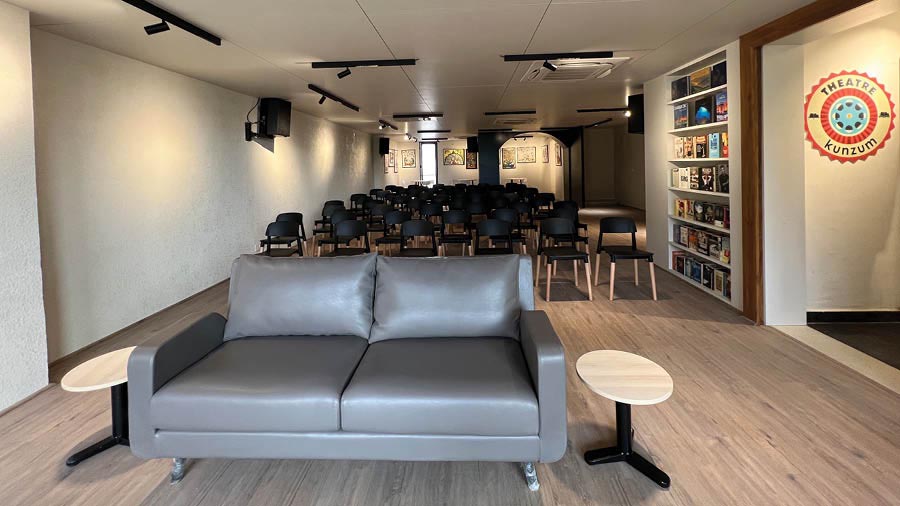
One of the floors of the GK Kunzum is a 125-seater events hall
Configuration is the design of the store, which has enough browsing space to allow readers to discover books they may not have discovered in an overstocked bookstore. Curation refers to the selection which will keep readers coming back. Community refers to everyone involved in creating books — writers, artists, designers, editors — that the bookstore aims to bring together. Which brings us to Convene, which is what people do for all the Kunzum events. They have hosted over 500 authors now and are adding many more events and partnerships, so that the literary community can use the floor areas which have been created to be utilised without cramming the browsing space. “In today’s day and age, not just books, you have to sell every commodity as an experience,” explains Jain.
Are publishers killing bookstores?
With books and readership being challenged by other forms of entertainment, curating experiences have indeed become important. Ajay’s advice to publishers is to “plug the discounting at Amazon, and the piracy of books”. He is convinced that to expand readership, publishers have to show intent. “Discounting is a problem. Publishers know their sellers, and if a reseller picks up a book on Amazon to resell, the publisher can tell Amazon to stop those people. They own the product, and if they say no, that can change things. The fact is, everyone is traceable,” he says.
The Penguin floor and other initiatives
The Penguin Floor in the GK 2 store showcases the best that Penguin Random House has to offer. The idea came about because Jain was in love with both the book-lined Penguin office as well their range of books, from graphic novels to an enviable international collection.
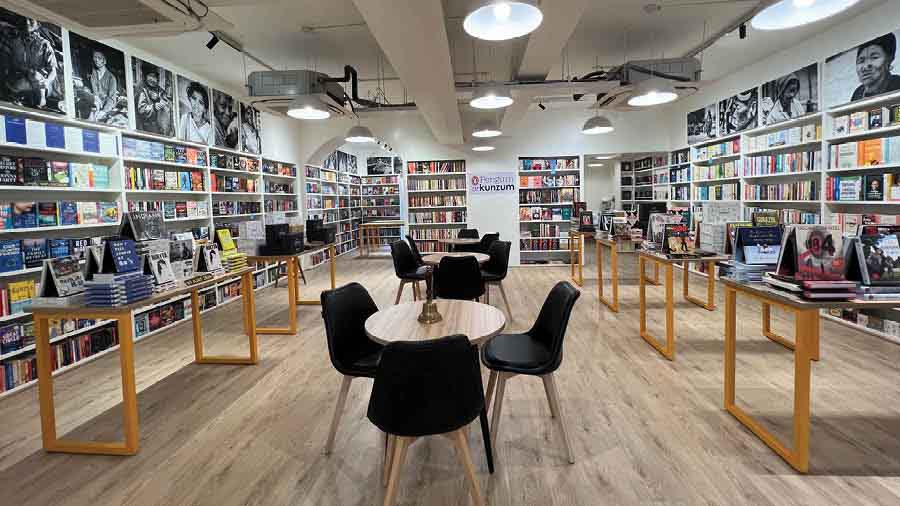
The Penguin Floor in the GK 2 store showcases the best that Penguin Random House has to offer
The children’s book section is called Kunzum Book Bees, named after the book club for children up to age 12 — Book Bees. There is also a general book club, Kunzum Book Club, where membership is free and guarantees first access to signed editions that are always in limited supply, priority invites to events, and a discount on Kunzum books.
The Kunzum CEO Book Club invites corporates to come on board to encourage the culture of reading. Jain has based this on the idea that all leaders are readers. “If you want to nurture leadership within your organisation, you need to promote readership,” he says. He appeals to companies to buy books on a structured basis, distribute them amongst their employees, and maybe go even beyond that by distributing them amongst vendors and customers, to spread the culture of reading.
Kunzum Key is a programme which is open to everyone, but primarily for creators of all kinds. You could be an actor, a dancer, a film-maker, a producer, an event-manager, a musician, anything! There is a free membership that allows them to create their art at Kunzum — use it as their workspace where they can brainstorm and even hold meetings. These creators get free WiFi, complimentary coffee or tea, and a 20 per cent discount on all books.
Matching books with readers
At an LGTBQIA+ event hosted in their store, a guest who loves books said she couldn’t read anymore because of an eyesight problem. There was another young person there who wanted to read books but could not afford to buy. They got chatting and, even though they’d never met each other, the former bought the book for the latter. She said, “I can’t read, but you can, so here’s the book for you.”
This is the sort of programme Jain is looking to institutionalise, by matching people who can afford books with people who want to read and can’t afford to buy.
Shantanu Ray Chaudhuri is an editor, publisher and writer
